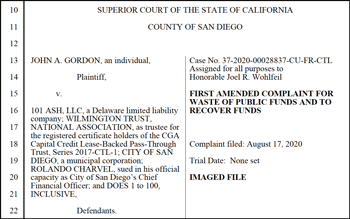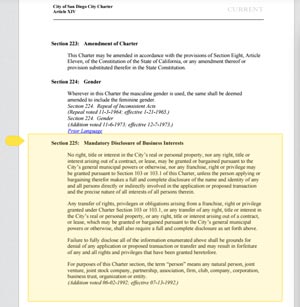101 Ash St. Deal Unconstitutional, Demand Return of Over $23M, Amended Lawsuit Claims

Editor-at-Large
A lawsuit seeking to undo the City of San Diego’s lease of a downtown building plagued by financial scandal and equipment failures was amended to claim the deal is illegal under the state’s constitution and is now seeking the return of over $23 million already paid by the City.
“The lawsuit was filed by a concerned taxpayer to do what the City isn’t doing – demanding the money back for a building that can’t be used. The lease purchase agreement was unconstitutional on its face and is void,” Maria Severson, one of the lawyers representing plaintiff John A. Gordon, a San Diego resident, told La Prensa San Diego immediately after the amended complaint was filed. Severson is a law partner of former City Attorney Michael J. Aguirre, and is also joined on the lawsuit by attorney Lawrence W. Shea.

The revised complaint, filed late Wednesday, sues Wilmington Trust which represents bond holders that financed the $91.8 million transaction in 2017 where the City agreed to a 20 year lease-to-buy transaction for the building at 101 Ash Street in downtown that formerly served as the headquarters for San Diego Gas & Electric and its parent company Sempra for nearly 50 years.
The lawsuit claims the sellers, Cisterra Development through its holding company 101 Ash LLC, and suspected “co-conspirators” misled and concealed from the City the true condition of the building, including air conditioning, heating, and electrical systems that were antiquated and non-functional, in addition to dangerous levels of asbestos that had not properly been maintained to keep tenants safe.
“This taxpayer action is brought under CCP § 526a because San Diego City officials have failed to fully vindicate the rights of Plaintiff and other San Diego taxpayers to stop the waste of funds and to recover funds already wasted relating to the 101 Ash Street building,” the lawsuit states.
The lawsuit claims the entire agreement is void under California Constitution Section 18 of Article 16 which states that “” meaning the financing should have been subject to a public vote.
Additionally, the State’s Constitution and state law bar public entities from wasting or gifting money without a legitimate purpose, so the lawsuit claims the City’s payments for the lease of a building that is inhabitable or not useful violates those legal provisions.
“The building located at 101 Ash Street Building does not have the public benefit or useful purpose because it cannot be used for its intended purposes—providing City services to the public. Since the building is unsafe for human occupancy, and the extensive of amount of remedial work required to make the building safe, the public will not be able to use the building in the foreseeable future,” the complaint reads.
The lawsuit names as defendants the City of San Diego; 101 Ash, LLC, the company created by Cisterra to be the landlord during the lease; Wilmington Trust who represents bond holders; Rolando Charvel, the City’s Chief Financial Officer; and yet unnamed “DOES” that may include individuals, companies, or others that “possessed an interest in the non-City Defendants and used their status to obtain funds from the City to ultimately benefit them.”
>
BUILDING DEFICIENCIES
Several examples of dilapidated or irreparable equipment are outlined in the lawsuit to demonstrate the inadequate condition of the building at the time the agreement was negotiated with the City in 2016 and subsequently initiated in January 2017. The sellers represented that the 53 year-old building had a useful life of 40 more years.
According to the lawsuit, the air conditioning and heating systems were inadequate, claiming that “because of obsolescence and poor upkeep, most of The Sempra Building’s heating, ventilation and air conditioning systems (HVAC) ran ineffectively needed to be replaced.”
The lawsuit claims that experts hired by the City in 2020 found that “the electrical system is also failing, which also contradicts the 40 year remaining useful life representations made by Defendants to induce the CITY to enter into” the lease, and that it is “fundamentally unreasonable if not a fraudulent misrepresentation of the building condition to state to the CITY that the electrical system at 101 Ash, which hadn’t been upgraded or materially modified since it was built in 1967, would serve the CITY presently let alone into the 2050s.”
“When the CITY tried unsuccessfully to occupy the building in December 2019, there was 0% heating and 50% cooling available to the workers, which is not only grossly out of sync with the exceptionally excellent building condition representations made by Defendants, it made the building literally uninhabitable,” the lawsuit claims.
The review done in 2020 found that some components of the air conditioning and heating equipment were 20 to 33 years passed their useful life cycles, in addition to outdated repairs made to keep asbestos encapsulated so it would not endanger employees and visitors to the building.
“In fact, the asbestos coating, which is applied to prevent asbestos fiber from flaking and falling off thus entering the ducting where it is blown into the workspace by the HVAC or making its way through the ceiling tiles and raining down into the workspaces, has also reached the end of its useful life and has failed,” the suit reads.
The most alarming failures seem to be to the fire protection systems which the lawsuit claims haven’t been upgraded since the building was first opened in 1967.
“In 2020, the CITY’s expert team determined that The Sempra Building’s original fire protection did not contain current Code-compliant fire-smoke dampers, smoke evacuation, and stairway smoke pressurization due to out-of-date fire protection standards. Moreover, directly contradicting Defendants, the original fire system did not appear to have been disturbed during the various tenant improvements made to the building.”
The lawsuit claims that “estimated costs for the repairs needed to make the Ash Street Building capable for safe employee occupancy was estimated by the CITY’S outside experts in 2020 to exceed $115 million, including $22 million for the HVAC components, $13.85 million for electrical improvements, $68.4 million in construction costs, and $8 million for lighting and Branch Wiring. In addition, it was estimated that it would take 4 years of additional non-occupancy for contractors to complete the job.”
Public testimony from a Sempra consultant in 2014 before the California Public Utilities Commission (PUC) concluded that staying in the 101 Ash building was not cost-effective.
“The overall long term costs of moving to either a new building built to Sempra Energy’s specifications or an existing building were less expensive than staying at the current facility. The most significant drivers that cause this result were the rent increases at the current building and the substantial cost over time to replace its aging infrastructure and asbestos remediation that would be triggered by such 22 replacements.”
>
RETURN OF MONEY PAID
The City made its monthly lease payment of $534,726.50 from January 2017 to September 2020, but halted the payments after Mr. Gordon filed his initial lawsuit in August 2020 seeking to stop further payments. In total, the City paid $23,527,966.00 in lease payments toward the $128,334,360 it is bound to make under the full-length of the lease agreement.
The lawsuit now asks the court to find that the agreement violates the provisions of the State Constitution and to declare it void, then seeks the return all monies paid by the City under the unlawful agreement.
One of the flaws in the agreement, the lawsuit contends, is that it does not allow for an abatement, or suspension, of lease payments if the City was not able to occupy the building as planned, as is standard is commercial leases.
The signed Lease Purchase Agreement (LPA) also states that the City releases all parties, including the sellers, landlord, lenders, agents, and others from any and all liabilities for known and unknown defects or conditions of the building, thereby shifting all the risk for any repairs or upgrades necessary to make the building operational back onto the City.
“The LPA is unconstitutional in the context of the building condition that was either not adequately disclosed or where the disclosures were false. An LPA procured on misrepresentations as to immediate occupancy without abatement is unconstitutional under Section 18,” the lawsuit claims.
The only remedy, the lawsuit contends, is for the court to find the agreement to be void and to demand that all parties return any proceeds defendants received under the deal.
“Plaintiff … is authorized to bring this suit against a private entity to disgorge public funds paid by a local entity on an allegedly illegal public contract. For the reasons set forth, above, the LPA is an illegal public contract that is void and should be set aside,” the lawsuit pleads.
>
HOW THE DEAL GOT DONE
The history of the 2017 acquisition of the 101 Ash building only became public again last year after the building as vacated under an order from the San Diego County Air Pollution Control District in January 2020 because of the asbestos exposure. The building has been vacant and boarded up for nearly a year now.
The City had been negotiating for additional office space in downtown for several years, and had attempted to buy the building from then-owner Sanford “Sandy” Shapery in 2014 and early 2015. The $100 million price was higher than the City believed the building was worth, so talks broke down.

In July 2015, however, local developer “Papa” Doug Manchester bought a 49% interest in 101 Ash for a reported $20 million, and within days, a tour of the building was attended by Mayor Kevin Faulconer and key City staff, including Mayor Chief of Staff Stephen Puetz, and the City’s Director of Real Estate Assets, Cybele Thompson.
As talks of a purchase continued on and off through mid-2016, Cisterra Development, a San Diego-based firm, negotiated a deal with Shapery and Manchester to buy the building for $72.5 million then sought a deal to flip it to the City
By mid-2016, the City and Cisterra had negotiated an agreement where the City had two options to buy the building: a straight purchase directly from the sellers which was estimated to cost the City $110.6 million; or a 20-year lease-to-buy deal where Cisterra would be the landlord and the City would own the property at the end of the lease term, which was estimated to cost $127.8 million over the term.

As La Prensa San Diego previously reported, senior City staff say Mayor Kevin Faulconer directed them in a September 6, 2017 meeting in his office to only pursue a lease deal instead of a direct purchase primarily because he wanted to avoid the City paying Doug Manchester directly, even though the Mayor was informed it would cost taxpayers at least $16 million more than a direct purchase.
Manchester had been one of Faulconer’s biggest political donors and the Mayor told staff he did not want to be seen as paying his donor directly. Through a lease, Cisterra would serve as a middleman in the transaction and it paid the sellers for the building. (Faulconer’s spokesperson, who was not in the meeting, denies the Mayor directed staff that way, but the Mayor’s office never demanded a correction or retraction from La Prensa San Diego.)
After that pivotal meeting, City staff began to use the comparison of estimated future office rents versus the long term lease rate to project savings for the City. The staff also raised legal issues that the City could possibly be sued if it tried to purchase the building directly, although the City Attorney’s office admitted no one had actually threatened to sue.

During the negotiations with Cisterra, one person that was heavily involved on behalf of the City was Jason Hughes, a licensed real estate broker that had been serving as a non-paid “Special Assistant for Real Estate Services to the City of San Diego” since 2013. Hughes was included on nearly every email between the City and Cisterra, and also met privately with Mayor Faulconer on several occasions to discuss the deal.
In the end, a lease deal was approved by the San Diego City Council in October 2016 and signed by San Diego City Attorney Mara Elliott’s office on December 18, 2016. During the approval process, the San Diego Municipal Employees union and the San Diego Firefighters’ Local union were supporting the agreement as a way to move city employees out of outdated city-owned and rental offices in various downtown buildings.
>
WHERE DID THE MONEY GO
After the City signed the lease deal that committed it to pay a total of $128.3 million over the term of the agreement, Cisterra used that document to secure its financing to actually buy the building. At the time the City signed the lease in December 2016, Cisterra had no control or ownership of the building. Financing documents show that Cisterra received $91.8 million in financing in January 2017 and paid the sellers a total of $72,440,000 for the building, but Cisterra has refuses to disclose who received the nearly $20 million in excess financing proceeds after the purchase of the building.

At the time of the agreement, San Diego City Charter Section 225 required that a party to a contract with the City “makes a full and complete disclosure of the name and identity of any and all persons directly or indirectly involved in the application or proposed transaction and the precise nature of all interests of all persons therein.”
Cisterra only disclosed to City staff the names of its principals, Jason Wood and Steve Black, but may not have disclosed the names of other persons that received proceeds from the transaction. Cisterra has not responded to repeated requests for documents and comment from La Prensa San Diego.
Section 225 provided that “failure to fully disclose all of the information enumerated above shall be grounds for denial of any application or transfer and may result in forfeiture of any and all rights and privileges that have been granted”.
A failure to disclose the names of people that directly benefited from the transaction would invalidate their participation, forcing them to return any money they previously received.
One person that refuses to respond to questions about his financial involvement in the deal is Jason Hughes. As a broker for the City, whether paid or unpaid, Hughes had a fiduciary duty to protect the City’s interests. Although brokers and real estate agent can represent both sides in a transaction, they must first have a signed dual agency agreement from both clients to do so. The City does not have any record of a signed dual agency agreement and senior City staff that negotiated the deal and interacted with Hughes claim they never suspected he was on both sides of the deal.
 Hughes has not responded to repeated calls, emails, phone messages, and contacts to his office seeking comment. After several attempts to contact him on Twitter, Hughes cancelled his Twitter account.
Hughes has not responded to repeated calls, emails, phone messages, and contacts to his office seeking comment. After several attempts to contact him on Twitter, Hughes cancelled his Twitter account.
If Hughes had a financial interest in the outcome of the lease transaction and was involved in the negotiations on behalf of the City he may have violated state laws that ban self-dealing in public transactions. Government Code section 1090 is a broad set of restrictions imposed on elected officials, employees, agents, and contractors that are involved in negotiating and approving government contracts.
Any violation of these laws would invalidate the contract and force the return of all proceeds. Section 1090 also has a criminal component that makes it a felony for anyone to participate the creation or approval of a public contract where they have a direct or indirect financial interest. It is also a felony for anyone who aids or abets someone in violating the contracting restrictions.
A 2017 California Supreme Court decision in the case of Dr. Hossain Sahlolbei held that even an independent contractor, advisor, or outside lawyer would fall under the self-dealing prohibitions of 1090 laws. That case clarified that nearly anyone involved in the “making” of a contract, including the negotiations, discussions, reasoning, planning, and give and take which goes beforehand in the making of the decision would have a conflict of interest, ruling that “independent contractors come within the scope of section 1090 when they have duties to engage in or advise on public contracting that they are expected to carry out on the government’s behalf.”
Cisterra has not responded to repeated requests for comment on its relationship with Hughes and whether Hughes received any money from Cisterra on the 101 Ash deal.
>
CITY’S OTHER 101 ASH LAWSUIT
The City of San Diego filed its own lawsuit in October 2020 seeking to “reform” or amend the lease to include rent abatement language to cover the current situation where the City cannot use the building due to equipment failures. The existing lease agreement does included rent abatement in the event of a “Destruction” of the premises but only for “an event of loss, damage or destruction, whether by fire or hazard or other casualty to all or any portion of the Premises (a ‘Casualty’) that is caused by a peril which is or should have been covered by a policy of insurance.” The disrepair of the building is not considered a “casualty” under the lease.
The City’s lawsuit only seeks to amend the agreement and the return of rent paid since the building was officially vacated in January 2020, not the return of all four years of rent already paid.
Gordon’s amended complaint states that the City’s October lawsuit fails to demand the return of “an additional unlawfully transferred amount of $19,250,154 paid by CITY from January 2017 to December 2019.” The new Gordon lawsuit counters that an unlawful agreement cannot be amended.
Because the two lawsuits name virtually the same defendants and revolve around the same contract and set of facts, the two cases may be consolidated into one action before the court.
>
TIMING OF THE CASES
One of the major differences in this newly amended complaint is that the defendants were immediately served after the lawsuit was filed with the court, thereby starting the 30-day period for defendants to respond. When Gordon’s original case was filed in August, the parties agreed not to serve the others to give time for possible negotiations to settle the case.
In October, the City and Gordon’s attorneys signed a stipulation that the City would agree to stop making the lease payments until the case was resolved, and Gordon’s attorneys agreed not to push forward against the City as a main defendant, instead focusing on the financiers and Cistera to recover taxpayer money. The agreement, however, was described by City Attorney Mara Elliott as a “settlement” that dismissed the City from the case. The City was not dismissed as a defendant in the case and remains a defendant in the newly amended complaint.
After four months, the parties were not any closer to resolving the matter than at the start when this amended complaint was filed last week.
Now that all parties have been served the amended lawsuit, Gordon’s lawyers can begin the discovery process in 30 days.
>
CISTERRA’S OTHER LOCAL DEALS
The same development company involved in the 101 Ash lease agreement has been and may continue to be involved in other land deals with the City.
In 2015, Cisterra negotiated and executed another building flip transaction with the City when they signed a 20-year lease-to-buy deal to buy the Civic Center Plaza building near City Hall. The City had already been renting a large portion of that building before trying to buy it using municipal bonds. When that financing was challenged, the City quickly negotiated a lease with Cisterra.
That deal was rushed through City Council without any committee hearings before approving the agreement that will cost the City more than $79 million in lease payments over the term. The building was appraised for $45.2 million. Broker Jason Hughes was also involved in negotiating that lease, and neither Hughes nor Cisterra responded to requests for comment on whether Hughes was paid any fees for his work on that deal.
Cisterra has also been involved in a proposal to develop the parking lot known as Tailgate Park next to Petco Park stadium. A group led by the Padres ownership group and development companies were selected over other proposals in September 2020 by Mayor Kevin Faulconer to enter into exclusive negotiations to build a mixed-use destination called East Village Quarter. For months, Cisterra was listed as one of the project partners, but was left out of the formal announcement in September after the 101 Ash project came under scrutiny. No public announcement was made that Cisterra was removed from the project.
In 2015, Cisterra developed the new Sempra Energy headquarters building, known as Cisterra Tower, near Petco Park under a 25-year lease deal. Sempra’s move to that new building left the 101 Ash building vacant, setting up the opportunity for Cisterra to negotiate the long-term lease with the City.


 Arturo Castañares
Arturo Castañares


